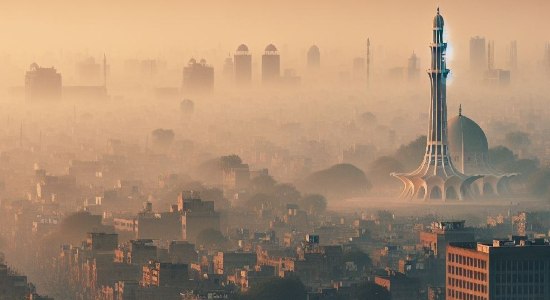By Muhammad Abubakar
Climate change refers to long-term shifts in our planet’s average weather patterns and temperature. Global temperatures are rising due to human activities like burning fossil fuels. This leads to warmer oceans, hotter summers, and colder winters in some regions.
Precipitation patterns are changing, leading to more intense droughts in some areas and increased flooding in other areas. Rising temperatures are causing glaciers and ice sheets to melt, contributing to rising sea levels and threatening coastal communities. Extreme weather events like hurricanes, cyclones, and wildfires are becoming more frequent and intense due to climate change.
Climate change is becoming one of the significant issues that the whole world faces nowadays. When some states started trying to achieve a higher economic status globally, they began developing numerous industries with various types of raw materials for export purposes.
This helps these states strengthen their economies. This is directly linked to the climate change issue that the world is facing nowadays. Industrial waste, in the form of smoke, mixes with the natural air and converts it into polluted air. When people breathe in that polluted air, it creates various types of diseases and other problems, as explained before.
Developed states contribute more to the climate change issue because they have the power to generate industries in larger numbers for economic purposes. This is one of the major reasons for contributing to the climate change issue.
Developing states like Pakistan have paid a major price and still suffer more from this issue. As seen in Pakistan, there are problems of major flood issues, rising temperatures, etc. In this way, developing states pay a price for this issue. Pakistan is still suffering from the climate change issue.
There are also industries in Pakistan that create pollution because there is no proper mechanism to manage the smoke created by the industries. Pakistan also contributes to the climate change issue, which is why it is suffering more and more in recent times.
Lahore, one of the big cities in Pakistan, with a significant population, is affected very much. It is considered one of the most polluted cities in the world and stands in the number one position in the ranking.
Climate change is having a significant impact on Lahore, the vibrant city currently. Lahore has witnessed warmer summers and longer heatwaves, with temperatures exceeding 40°C becoming increasingly common. This puts a strain on people’s health, especially populations like the elderly and children.
There’s been a shift towards more erratic rainfall patterns, with unpredictable monsoon seasons and intense downpours causing flash floods. This disrupts agriculture, damages infrastructure, and threatens water security.
Lahore has long battled air pollution, and climate change exacerbates this issue. Rising temperatures trap pollutants and create smog layers leading to respiratory illnesses, allergies, and reduced visibility. Melting glaciers in the Himalayas, Lahore’s water source, are shrinking due to rising temperatures. This results in reduced water availability impacting agriculture, domestic use, and industrial activities.
Nowadays, Lahore is suffering from the issue of smog. Smog is created with fog and smoke, so in the winter season, this problem rises, and people have to face different diseases when they breathe in that polluted air.
This problem increases every winter because the government doesn’t put effort into a long-term solution to eradicate this problem. A recent development occurred by the provincial government of Punjab to eradicate the problem of smog is artificial rain.
Two days ago, this activity was done, and the government got a positive result as a decrease in the level of smog. So, this type of activity should be appreciated, but there is a need for a long-term solution. The government should take steps to overcome the problems of climate change. Despite the challenges, there are efforts underway to adapt to and mitigate climate change in Lahore.
Some initiatives include:
- Improving water management systems to conserve and efficiently utilize water resources.
- Planting trees to improve air quality and reduce the heat island effect.
- Promoting renewable energy to reduce greenhouse gas emissions.
- Raising awareness about climate change and encouraging sustainable practices.
(The Writer is a Student of BS International Relations at the University of Central Punjab )













